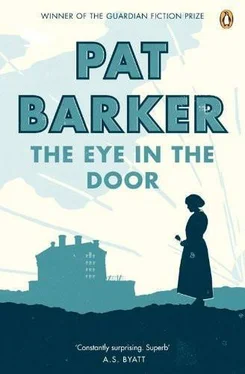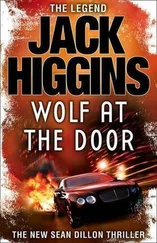The boat was already moored when they reached the landing stage, and beginning to be crowded. At the last moment, as the engine began to throb, a crowd of people swept on board, including what looked like a girls’ school party. Prior stood up and gave one of the teachers his seat. ‘I’ll get you a cup of tea,’ he whispered to Sarah and went to the bar.
As he stood waiting his turn, the roar increased, the river churned, and they began moving out into midstream. He got the tea, took it back to Sarah, and tried to drink his own, but found it too difficult to keep his feet on the tilting deck, so he moved away from her and went to stand in the doorway that connected the covered deck with the open benches in the stern. Even these were full, and in fact the rain had almost stopped. A white sun could be glimpsed now and then through a hazy veil of cloud.
On the front bench a group of elderly cockney men were making the best of a bad job, laughing and joking at everything. A little way behind, on the end of the third bench, sat a man with unusually broad shoulders. He looked like Spragge, but it was difficult to tell because he was wearing a hat and facing away from Prior. Prior craned to see the side of his face. It was Spragge. Had to be. And yet he wasn’t sure. There was something odd about the way the man didn’t turn, didn’t move. Edging along the railing towards him, Prior became aware of a slowness in his movements, as if he were wading through glue. He saw himself, in his mind’s eye, go up to the man, tap him on the shoulder, wait for him to turn, and the face that turned towards him… was his own. He sat down, his eyes level with the railings from which a row of glittering raindrops hung. He reached out his hand and, with the tip of his forefinger, destroyed them one by one. The wet, running uncomfortably under his shirt cuff, brought him back to himself. He looked again. It might or might not be Spragge, but it certainly looked nothing like him . The whole powerful, brutal bulk of the head and shoulders was as different from his own slight build as any two physiques could be, and yet again, as he got up and began to move forward, he felt he was looking at the back of his own head. He breathed deeply, gazing through the rails at the brown, swollen, sinuous river, making himself follow individual twigs and leaves as they were borne along, noticing how the different currents of water, as they met and parted, rippled like muscles under skin. They were approaching another bridge. He steadied himself, walked up to the man and tapped him on the shoulder.
Spragge’s face was a relief. So much so that it took several seconds for the anger to surface. ‘What the hell are you doing here?’
‘Going back to London. What are you doing?’
He sounded genuinely surprised, but Prior had caught the hiccup of laughter in his voice. Spragge had spoken more loudly than he needed, playing to the small audience of cockneys, and to the larger audience on the benches behind.
Prior lowered his voice. ‘Are you following me?’
‘ Following you?’ Again very loud. ‘Now why should I do that?’
He sounded like a bottom-of-the-bill music-hall actor conveying injured innocence. The impression was not of somebody who’d decided to act as one possible response to a situation, but of somebody who couldn’t not act. You had the feeling he would act in front of the bathroom mirror. That if ever you succeeded in ripping the mask off there would be no face behind it. Prior felt a wave of revulsion. ‘If you’re following me,’ he said, ‘I’ll—’
‘Yes, what will you do?’ Spragge waited, as if the question genuinely interested him. ‘Call the police? Have me arrested? It’s not against the law to go to Kew.’ He smiled. ‘Nice girl,’ he said, nodding towards the prow. And then he cupped his hands against his chest.
‘If you go anywhere near her, I’ll break your fucking neck.’
Spragge laughed, jowls shaking. He put his hand on Prior’s chest and slapped it, genially. ‘That’s all right,’ he said. Then he sat down again and looked out over the river, with no more than a sideways glance at the cockneys, and a faint smile.
In something not moving, something too steady for a boat. Hands, mottled purple and green, moved along polished wood. Then he was back, staring up at a window made of chips of purple and green light. He looked for Sarah and couldn’t see her. In a panic he leapt up and began searching the Abbey, thrusting tourists aside, trailing hostile stares.
He found her at last, standing by the effigy of an eighteenth-century bishop, running her hand over the smooth marble. A shaft of sunlight had found the auburn lights in her hair.
She looked up as he arrived, breathless. ‘You back now?’
The question was so apposite it silenced him. For a moment he thought, she knows . And immediately rejected the idea. Of course she didn’t know.
They went home by taxi. Prior thought about Spragge, because he was afraid of thinking about anything else. What angered him was the thought that Spragge might have seen that little act of intimacy in the Palm House when Sarah had moved closer and rubbed his cock through the hard cloth of his breeches. A good moment. In all that press of wet, sweating, steamy-skinned people, they’d been alone, and then Spragge’s face peering through the leaves. Had he seen? He must have. Prior was aware of feeling an almost excessive sense of exposure, of violation even, as if he’d been seen, arse upwards, in the act itself.
The taxi jolted and swayed. A memory started to surface that seemed to have nothing to do with the afternoon’s events. He was ill with asthma, walking with his father’s hand. Where could they have been going? His father had never taken him anywhere, he’d been too ashamed of the little runt that had mysteriously sprung from his loins. Perhaps his mother had been ill. Yes, that was it.
They’d sat on a bench somewhere, and a woman brought him lemonade. Real lemonade, his father had said proudly — but why proudly? — not that gassy bottled stuff. There had been lime jelly too, with jelly babies suspended in it. While he was picking at it, his father and the woman went upstairs. He could hear voices from the open window above his head. The boy, Harry . Then his father’s voice, thick and hurried. He’s all right. Wraps himself round that lot he won’t have much to grumble about .
‘Wrapping himself round that lot’ had not been easy. He loved jelly, but hated jelly babies, mainly because of the way people ate them, nibbling at their feet, then at their faces, then boldly biting off the head and turning the headless body round to display the shiny open wound. He contemplated eating his way round them, freeing them from their quivering prison, but he knew he couldn’t do that. The jelly had been specially made — it wasn’t grownup food — and his father would be angry. So, one by one, he had forced them down, swallowing them whole, his eyes fixed on the trees so he wouldn’t have to think about what he was doing. Even so, he’d gagged once or twice, his eyes had watered, while upstairs the thick whispers came and went and the bed springs creaked.
On the way home his father had said, casually, ‘Better not tell your mam.’ And then he’d sat him astride his shoulders and carried him all the whole way home, all the way up the street with everybody looking, his meaty hands clasped round his son’s thin white thighs. For once he’d ridden home in triumph. And he hadn’t told his mam, though he’d stood by her sick bed and listened to his father describe a visit to the park. He’d been invited to join the great conspiracy and even at the age of five he knew the value of it. He wasn’t going to jeopardize future outings by telling her anything.
Читать дальше












